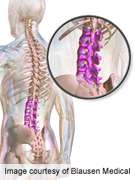Compared to minimal interventions, self-management has a small effect on pain and disability in non-specific low back pain, according to a review published online May 23 in Arthritis Care & Research.
(HealthDay) -- Compared to minimal interventions, self-management has a small effect on pain and disability in non-specific low back pain (LBP), according to a review published online May 23 in Arthritis Care & Research.
Vinicius C. Oliveira, of the University of Sydney in Australia, and associates conducted a systematic review and meta-analysis of the literature to investigate the effectiveness of self-management for non-specific LBP. Short-term (less than six months after randomization) and long-term (12 months or more after randomization) analyses were conducted separately.
Based on data from 13 original trials, the researchers found moderate quality evidence that, in LBP, self-management was effective for improving pain and disability. At short-term follow-up, the weighted mean difference for pain was −3.2 points (on a 0 to 100 scale) and the weighted mean difference for disability was −2.3 points. The corresponding figures for long-term follow-up were −4.8 and −2.1 points.
"There is moderate quality evidence that self-management has small effects on pain and disability in people with LBP," the authors write. "Although effective when compared to minimal intervention, we are unsure if self-management provides worthwhile effects in the management of LBP. These results challenge the endorsement of self-management in treatment guidelines."
More information:
Abstract
Full Text (subscription or payment may be required)
Journal information: Arthritis Care & Research
Copyright © 2012 HealthDay. All rights reserved.






















